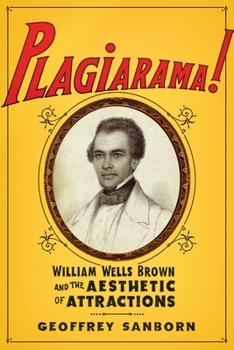Plagiarama!: William Wells Brown and the Aesthetic of Attractions
Select Format
Select Condition 
Book Overview
William Wells Brown (1814-1884) was a vocal abolitionist, a frequent antagonist of Frederick Douglass, and the author of Clotel, the first known novel by an African American. He was also an extensive plagiarist, copying at least 87,000 words from close to 300 texts. In this critical study of Brown's work and legacy, Geoffrey Sanborn offers a novel reading of the writer's plagiarism, arguing the act was a means of capitalizing on the energies of mass-cultural entertainments popularized by showmen such as P. T. Barnum. By creating the textual equivalent of a variety show, Brown animated antislavery discourse and evoked the prospect of a pleasurably integrated world.
Brown's key dramatic protagonists were the "spirit of capitalization"--the unscrupulous double of Max Weber's spirit of capitalism--and the "beautiful slave girl," a light-skinned African American woman on the verge of sale and rape. Brown's unsettling portrayal of these figures unfolded within a riotous patchwork of second-hand texts, upset convention, and provoked the imagination. Could a slippery upstart lay the groundwork for a genuinely interracial society? Could the fetishized image of a not-yet-sold woman hold open the possibility of other destinies? Sanborn's analysis of pastiche and plagiarism adds new depth to the study of nineteenth-century culture and the history of African American literature, suggesting modes of African American writing that extend beyond narratives of necessity and purpose, characterized by the works of Frederick Douglass and others.Format:Paperback
Language:English
ISBN:0231174438
ISBN13:9780231174435
Release Date:June 2019
Publisher:Columbia University Press
Length:224 Pages
Weight:0.60 lbs.
Dimensions:0.5" x 5.6" x 8.7"
Customer Reviews
0 rating





